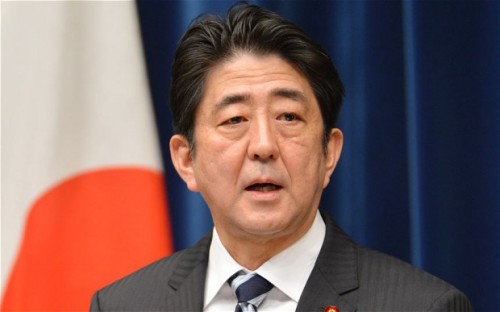Japanese Prime Minister Shinzo Abe on Wednesday, January 23, 2019 said he would seek to use his chairmanship of the Group of 20 leading economies to rebuild trust in the global trade system.

His speech to the World Economic Forum in the Swiss Alps was significant at a time when a bitter Sino-U.S. trade dispute is one of several factors threatening to bring about a sharp slowdown in global growth.
“Japan is determined to preserve and committed to enhancing the free, open, and rules-based international order.
“I call on all of you to rebuild trust toward the system for international trade.
“That should be a system that is fair, transparent, and effective in protecting intellectual property rights and also in such areas as e-commerce and government procurement,” he told delegates.
With the French, British and U.S. leaders cancelling their visits because of more pressing concerns at home, Abe is one of only three Group of Seven leaders attending the annual event in Davos.
Abe said Japan, as chair of this year’s gathering of the Group of 20 (G20), will also seek to spearhead discussions on climate change and ways to facilitate use of digital data while protecting intellectual property.
The comments underscore Japan’s hope to rally support from some of its G20 counterparts in pushing for a multilateral approach in solving trade frictions.
“That could help Tokyo fend off pressure from Washington to open up its politically sensitive agriculture market and take other steps to fix bilateral trade imbalances,’’ analysts say.
Takeshi Niinami, head of brewer Suntory Holdings Ltd (SUNTH.UL) and an economic adviser to Abe, said Japan has to be consistent on the need to promote free trade.
“It should not change this stance even if the United States is always talking about doing a bilateral deal.
“Australia, Singapore and other Trans-Pacific Partnership (TPP) countries could help Japan make free trade a key topic of debate at the G20,” Takeshi told Reuters.
At his previous Davos visit in 2014, Abe pledged to pull the economy out of stagnation with his “Abenomics” mix of fiscal spending, ultra-easy monetary policy and steps to boost Japan’s potential growth via labour market reform and deregulation.
Five years later, the boost to growth from Abenomics is fading, inflation remains far below the Bank of Japan’s target and critics point to a lack of progress on deregulation.
Abe sought to counter such criticism, saying that through job-creating policies he had demolished “a wall of despair and pessimism on Japan” that had existed five years ago.
He said Japan hoped to build a G20 consensus on the need to reduce plastic waste flowing into the oceans and coordinate on global usage of digital data without infringing on personal privacy and intellectual property.
“I must say that spending money for a green earth and a blue ocean, once deemed costly, is now a growth generator,” he said.
“Decarbonisation and profit making can happen in tandem. We policy makers must be held responsible to make it happen, as I will be stressing in Osaka this year.” People close to the premier have said that Abe is keen to use the G20 summit in Osaka, western Japan, in June to boost his poll ratings ahead of an upper house election looming mid-year.
